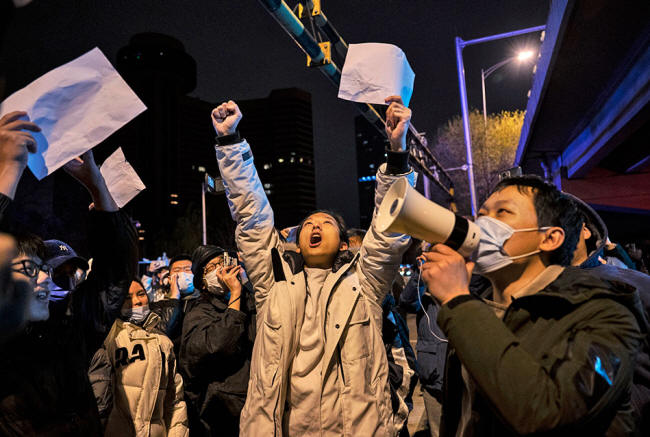|

by Tiffany Meier, Kevin Hogan and Hannah Ng
December 06,
2022
from
TheEpochTimes Website

Protesters shout slogans during a protest
against the Chinese Communist Party's
strict zero COVID measures in Beijing, China,
on Nov. 28, 2022.
(Kevin Frayer/Getty Images)
COVID-19
Protests
The mass protests against Beijing's "zero-COVID" policy
in China
reveal a weakening of the communist regime, according to Anders
Corr, publisher of the
Journal of Political Risk.
"It makes them
look weaker than it was in the past," Corr, who is also an Epoch
Times contributor, said in an interview with
NTD, sister media outlet of The Epoch Times, on Nov. 29.
Since the
Tiananmen
Square protests in 1989, which were much bigger and more centralized
in Beijing, people have gotten used to very little dissent in China,
he said.

Anders Corr,
publisher of the 'Journal of Political Risk'
and author of
"The Concentration of Power,"
in New York on Dec. 13, 2021.
(Bao Qiu/The Epoch Times)
"There have
been frequently scattered protests in China on more local
issues, like land issues, or banks that don't pay their
depositors," Corr said.
"But these
kinds of bigger, broader, more decentralized protests, that are
focused on a national level policy, are really new."
His view was echoed
by Jon Pelson, author of the book "Wireless
Wars - China's Dangerous Domination of 5G and How We're Fighting
Back."
Trailblazing Students
Pelson called the
massive demonstrations "extraordinary" because,
many of the students
who participated might have had no knowledge of the Tiananmen Square
protests that happened before they were born...
The Chinese
regime's vast internet censorship apparatus has scrubbed online any
mention of the event that occurred more than 30 years ago.
The students'
parents might not speak about the event out of fear that their
child's teacher would bring trouble to them, according to Pelson.
"So these
students [involved in the protests] think that they're
trailblazing.
And... that's a wonderful thing, because it maybe
gives them a little more courage to do what they're doing," Pelson said in an interview with "China
in Focus" program on NTD.
"But if they
saw how it turned out 30-something years ago, I hope they're not
headed for that same outcome.
Because
Chairman Xi doesn't seem to be a very sympathetic character
who's willing to allow people to express their views," he added,
referring to Chinese Communist Party (CCP)
leader Xi Jinping.
Corr further noted
that the regime is trying to pin blame on local officials.
"They're
claiming that the protests are a result of individual level,
local level party members who've made mistakes... and that way
removes blame from the national level, so that the focus doesn't
go against the CCP and Xi Jinping," he said.
International Support
In Corr's view,
trade interests have hindered the
Biden administration from issuing
a stronger response to the
COVID protests in China.
The White House
earlier this week voiced its support for the right of peaceful
protest, but stopped short of directly expressing support for
protesters' demand for greater freedoms in China.
"The Biden
administration does want to support, of course, democracy and
freedom in China as everyone does. But at the same time, they
don't want relations to deteriorate too much," Corr said.
"They're not
tough enough, because they want to get the trade of
$650 billion a year going again,
$2.3 trillion [worth] of U.S. institutional investment by
last count in China, all of that needs to be protected from
their perspective," he added.
But the China
expert hoped that the support and solidarity shown to protesters in
China by the international communities would increase pressure on
the CCP to,
"democratize
the processes to give people a bigger voice."
"These COVID
protests are very clearly one of those cases where they just
can't hold the people back," Corr said.
Additional information - Video
|



